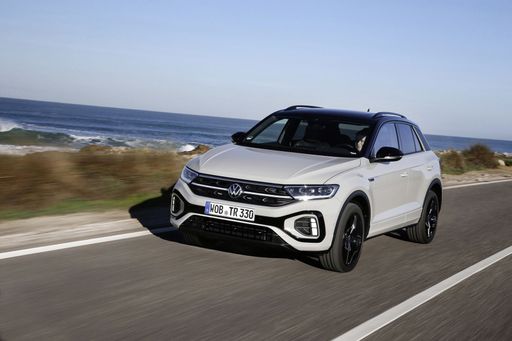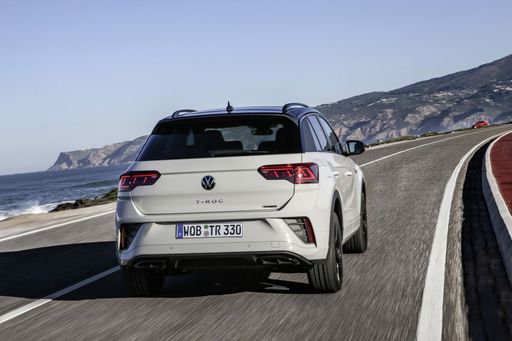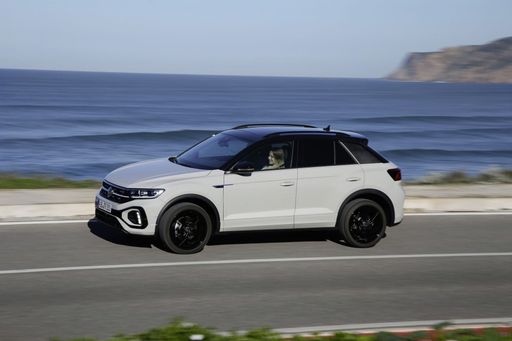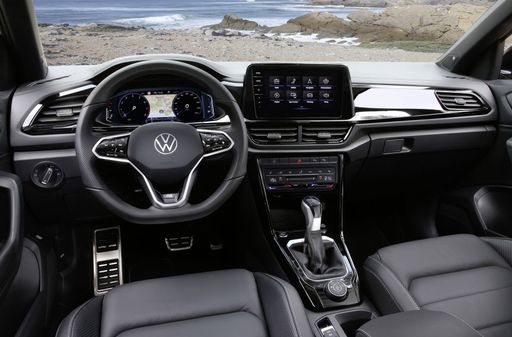Hyundai Tucson vs VW T-Roc - Differences and prices compared
Compare performance (288 HP vs 150 HP), boot space and price (20900 £ vs 26400 £ ) at a glance. Find out which car is the better choice for you – Hyundai Tucson or VW T-Roc?
Costs and Efficiency:
Price and efficiency are often the first things buyers look at. Here it becomes clear which model has the long-term edge – whether at the pump, the plug, or in purchase price.
Hyundai Tucson has a distinct advantage in terms of price – it starts at 20900 £ , while the VW T-Roc costs 26400 £ . That’s a price difference of around 5541 £.
Fuel consumption also shows a difference: Hyundai Tucson manages with 2.70 L and is therefore significantly more efficient than the VW T-Roc with 5.50 L. The difference is about 2.80 L per 100 km.
Engine and Performance:
Power, torque and acceleration say a lot about how a car feels on the road. This is where you see which model delivers more driving dynamics.
When it comes to engine power, the Hyundai Tucson has a significantly edge – offering 288 HP compared to 150 HP. That’s roughly 138 HP more horsepower.
In acceleration from 0 to 100 km/h, the Hyundai Tucson is a bit quicker – completing the sprint in 7.50 s, while the VW T-Roc takes 8.90 s. That’s about 1.40 s faster.
In terms of top speed, the VW T-Roc performs minimal better – reaching 212 km/h, while the Hyundai Tucson tops out at 204 km/h. The difference is around 8 km/h.
There’s also a difference in torque: Hyundai Tucson pulls clearly perceptible stronger with 379 Nm compared to 250 Nm. That’s about 129 Nm difference.
Space and Everyday Use:
Beyond pure performance, interior space and usability matter most in daily life. This is where you see which car is more practical and versatile.
Both vehicles offer seating for 5 people.
In curb weight, VW T-Roc is hardly perceptible lighter – 1465 kg compared to 1542 kg. The difference is around 77 kg.
In terms of boot space, the Hyundai Tucson offers clearly perceptible more room – 620 L compared to 475 L. That’s a difference of about 145 L.
In maximum load capacity, the Hyundai Tucson performs clearly perceptible better – up to 1799 L, which is about 449 L more than the VW T-Roc.
When it comes to payload, Hyundai Tucson hardly perceptible takes the win – 545 kg compared to 515 kg. That’s a difference of about 30 kg.
Who comes out on top?
Overall, the Hyundai Tucson shows itself to be outperforms in nearly all aspects and secures the title of DriveDuel Champion.
It convinces with the more balanced overall package and proves to be the more versatile choice for everyday use.

Hyundai Tucson
Costs and Consumption
View detailed analysis
Engine and Performance
View detailed analysis
Dimensions and Body
View detailed analysis
Hyundai Tucson
Hyundai Tucson marries bold, sculpted looks with a clever, roomy cabin that feels smarter than its price tag suggests. It's composed on the road, easy to live with day-to-day, and a sensible choice for buyers who want SUV style without the showroom theatrics.
details




VW T-Roc
The VW T-Roc mixes cheeky, coupe-like styling with the everyday sense and space of an SUV, so it looks fun without sacrificing family sense. It’s a likeable all-rounder with tidy road manners and plenty of personality, ideal if you want a car that’s practical enough for chores but entertaining enough to enjoy.
details



Costs and Consumption |
|
|---|---|
|
Price
20900 - 47900 £
|
Price
26400 - 38600 £
|
|
Consumption L/100km
2.7 - 7.6 L
|
Consumption L/100km
5.5 - 6.3 L
|
|
Consumption kWh/100km
-
|
Consumption kWh/100km
-
|
|
Electric Range
63 - 70 km
|
Electric Range
-
|
|
Battery Capacity
-
|
Battery Capacity
-
|
|
co2
62 - 172 g/km
|
co2
126 - 143 g/km
|
|
Fuel tank capacity
52 - 54 L
|
Fuel tank capacity
50 L
|
Dimensions and Body |
|
|---|---|
|
Body Type
SUV
|
Body Type
SUV
|
|
Seats
5
|
Seats
4 - 5
|
|
Doors
5
|
Doors
5
|
|
Curb weight
1542 - 1893 kg
|
Curb weight
1465 - 1539 kg
|
|
Trunk capacity
546 - 620 L
|
Trunk capacity
284 - 475 L
|
|
Length
4525 - 4535 mm
|
Length
4373 mm
|
|
Width
1865 mm
|
Width
1811 - 1828 mm
|
|
Height
1650 mm
|
Height
1573 mm
|
|
Max trunk capacity
1795 - 1799 L
|
Max trunk capacity
1350 L
|
|
Payload
518 - 545 kg
|
Payload
368 - 515 kg
|
Engine and Performance |
|
|---|---|
|
Engine Type
Petrol, Full Hybrid, Plugin Hybrid, Diesel MHEV
|
Engine Type
Petrol, Petrol MHEV
|
|
Transmission
Manuel, Automatic
|
Transmission
Manuel, Automatic
|
|
Transmission Detail
Manual Gearbox, Dual-Clutch Automatic, Automatic Gearbox
|
Transmission Detail
Manual Gearbox, Dual-Clutch Automatic
|
|
Drive Type
Front-Wheel Drive, All-Wheel Drive
|
Drive Type
Front-Wheel Drive
|
|
Power HP
136 - 288 HP
|
Power HP
115 - 150 HP
|
|
Acceleration 0-100km/h
7.5 - 11.6 s
|
Acceleration 0-100km/h
8.9 - 12.3 s
|
|
Max Speed
196 - 204 km/h
|
Max Speed
196 - 212 km/h
|
|
Torque
250 - 379 Nm
|
Torque
200 - 250 Nm
|
|
Number of Cylinders
4
|
Number of Cylinders
3 - 4
|
|
Power kW
100 - 212 kW
|
Power kW
85 - 110 kW
|
|
Engine capacity
1598 cm3
|
Engine capacity
999 - 1498 cm3
|
General |
|
|---|---|
|
Model Year
2025
|
Model Year
2024 - 2025
|
|
CO2 Efficiency Class
F, D, E, B
|
CO2 Efficiency Class
E, D
|
|
Brand
Hyundai
|
Brand
VW
|
What drive types are available for the Hyundai Tucson?
Available configurations include Front-Wheel Drive or All-Wheel Drive.




